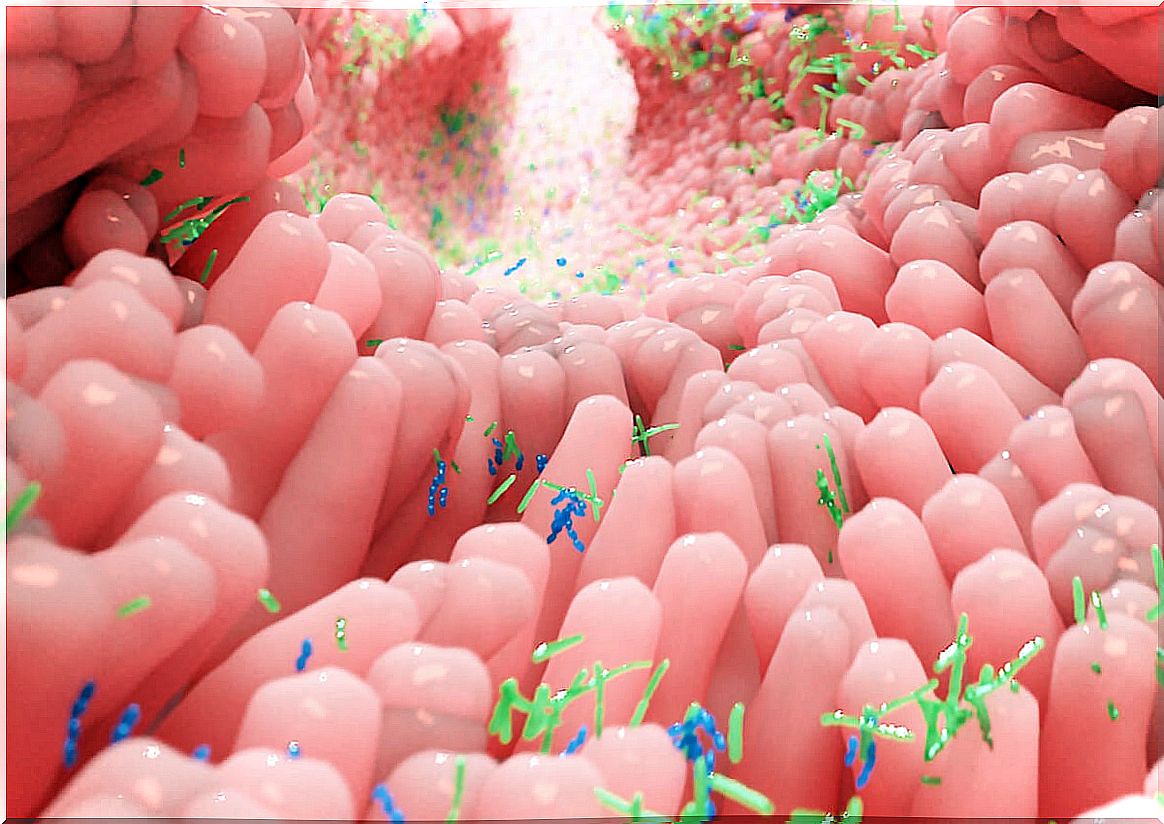The 10 Functions Of The Intestinal Microbiota

The functions of the gut microbiota are one of the great research objectives of the 21st century. The reason is that more and more studies show the importance of a balance in the microorganisms that live in our digestive tract.
These functions are especially important for optimal overall health. Therefore, the most up-to-date research is analyzing the relationship of the microbiota with the different organs. The gut-brain axis has been studied for years, but there are more and more studies on the gut-lung axis, the gut-skin axis or the gut-liver axis.

What is the gut microbiota?
The microbiota is the microbial ecosystem that lives in the gastrointestinal tract and has an extremely important role in the physiology and pathophysiology of health and disease.
It is made up of around 100 trillion microorganisms. Among these, more than 400 species of bacteria stand out, as well as different types of viruses, fungi, protozoa and a good number of microbes.
The functions of the gut microbiota are very diverse. However, most are related to the digestive, immune, nervous, endocrine systems and our metabolism. Let’s look at the most important ones.
The main functions of the gut microbiota
Let’s go with them:
- Manufacture and absorption of nutrients. Healthy bacteria in the gastrointestinal tract produce some vitamins such as vitamin K, niacin (B3), pantothenic acid (B5), pyridoxine (B6), biotin (B7), folic acid (B9), and vitamin B12. They also increase the bioavailability of minerals such as iron, calcium, magnesium, copper, and zinc.
- Nutrition and metabolism. The fermentation of carbohydrates in the intestine is the major source of energy in the production of short chain fatty acids, known as SCFA. The main SCFAs, acetate, propionate and butyrate, are involved in a large number of beneficial functions for the body.
- Synthesis and modulation of neurotransmitters. The intestine is the main producer of serotonin. The enterochromaffin cells of the intestinal mucosa are responsible for synthesizing and storing it. Additionally, the microbiota also regulates the neurotransmitters GABA, glutamate, dopamine, tryptamine, and norepinephrine.
- Protection function. In order to preserve their territory, the microbiota bacteria generate a barrier effect to avoid foreign bacteria to the ecosystem. This is possible because they secrete antimicrobial substances that inhibit the proliferation of pathogenic bacteria.
- Regulation of the immune system. The intestinal microbiota plays a decisive role in the immune system. It largely regulates innate immunity and adaptive immunity. In fact, it is estimated that about 80% of immune cells are found in the intestine.
- Production of natural antibodies. The microorganisms of the microbiota act as antigen presenters and generate an immune response that prevents the invasion of pathogens.
- Cancer protection function. Short chain fatty acids like butyrate have an anti-inflammatory effect. This factor can help, among many other beneficial functions, to protect against colon cancer and other types of cancer.
- Modulation of energy metabolism. The intestinal microbiota participates in the storage of fat in adipocytes. In fact, the consumption of unhealthy fats alters the composition of the microbiota and predisposes to a pro-inflammatory state.
- Intervention in glucose levels . When there is a dysbiosis, that is, an imbalance in the intestinal ecosystem, health runs the risk of easily worsening. For example, there is a greater predisposition to low-grade inflammation and the development of insulin resistance.
- Regulation of intestinal transit. There is a direct relationship between the state of the microbiota and constipation. Thus, a high percentage of dysbiosis has been observed in studies among patients with chronic constipation compared to healthy controls.

A good part of health is in the gut
As the publications of recent years indicate, the microbiota is an important variable in the state of health: the number of pathologies associated with its state has grown. Among them, asthma, non-alcoholic fatty liver, celiac disease, Crohn’s disease or irritable bowel syndrome, among many others.
Therefore, it is important that we pay attention to digestions. Such common symptoms, such as dyspepsia, bloating, diarrhea, constipation or abdominal pain can be indicators that the microbiota is altered. A specific annoyance does not have to worry us at first, but if it continues over time it may indicate the presence of a dysfunction or pathology. In that case, it will be important to consult with a digestive health specialist.









